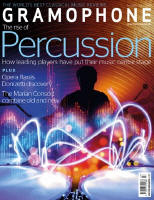Texte paru dans: / Appeared in: |
|
|
Outil de traduction (Très approximatif) |
|
|
Reviewer: Richard Wigmore Death-longing and the almost erotic union of Christ and the soul-as-bride are the keynotes of these ‘Dialogue Cantatas’, each of them in effect a spiritual chamber opera. Best known of the three is the Christmas cantata Selig ist der Mann (No 57), where St Stephen’s martyrdom symbolises the blissful release-in-death that awaits the faithful. But the others are hardly less rich musically: the Epiphany cantata Liebster Jesu, mein Verlangen (No 32), with its piercingly beautiful opening aria for soprano with oboe obbligato and its euphoric final duet; and the cantata for the Trinity season, Ich geh und suche mit Verlangen (No 49), whose highlights are an overtly erotic ‘wedding’ aria for soprano with violoncello piccolo and a final chorale duet which sets the two singers against a cavorting organ obbligato. Playing words as well as tones, with a keen understanding of Bachian rhetoric, the superb Berlin instrumentalists are consistently illuminating. Raphael Alpermann directs with a light, sympathetic touch, and his organ obbligatos in No 49 (including the bouncy Sinfonia which Bach plundered for his E major Harpsichord Concerto, BWV1053) are models of style and rhythmic élan. The Belgian soprano Sophie Karthäuser, too, gives consistent pleasure with her fresh, pellucid tone and mingled poise and quickness of emotional response. In recitative and aria alike she never lets you forget that these cantatas are intense dramas of the soul: say, in the heightened urgency she brings to the repeated ‘Wo find ich dich?’ in No 32’s sublime opening aria (where oboist Xenia Löffler matches her in eloquence), or her heady joy, egged on by frolicking solo violin, in the final aria of No 57. While Michael Volle successfully fines down his voluminous Wagnerian voice (he is an admired Wotan, Sachs and Beckmesser), he doesn’t strike me as a natural in Bach. His singing, though not always ideally steady, has a certain no-nonsense directness. He is careful not to overpower Karthäuser in the duets, and on his own is impressively vehement – surprisingly agile, too – dispatching the enemies of righteousness in No 57’s ‘Ja, ja, ich kann die Feinde schlagen’. But his sturdy contributions are short on tenderness, colouristic subtlety and expressive engagement with the text – qualities found in spades in the recordings of Nos 32 and 57 by Barry McDaniel (with Fritz Werner – Erato, 1/05) and Peter Harvey (with Gardiner – SDG, 12/06, 12/10). Volle’s limitations are all the more frustrating when set alongside the radiant Sophie Karthäuser, who on this showing is a Bach soprano in the class of Agnes Giebel, Elly Ameling and Arleen Auger – and it doesn’t get much better than that. |
|




